
The ring-tailed vontsira, locally still known as the ring-tailed mongoose, is a euplerid in the subfamily Galidiinae, a carnivoran native to Madagascar. It is the only species in the genus Galidia.

Melicytus ramiflorus (māhoe) is a small tree of the family Violaceae endemic to New Zealand.

Ctenochasma is a genus of Late Jurassic ctenochasmatid pterosaur belonging to the suborder Pterodactyloidea. Three species are currently recognized: C. roemeri, C. taqueti, and C. elegans. Their fossilized remains have been found in the Solnhofen Limestone of Bavaria, Germany, the "Purbeck Group" of northeastern Germany, and the Calcaires tâchetés of eastern France.

Caenorhabditis is a genus of nematodes which live in bacteria-rich environments like compost piles, decaying dead animals and rotting fruit. The name comes from Greek: caeno- ; rhabditis = rod-like.

COSplay MODE Magazine (COSMODE) is a Japanese-language magazine about cosplay.

The elegant water shrew is a species of mammal in the subfamily Soricinae of the family Soricidae. It is the only species within the genus Nectogale. It lives in Sikkim and China.
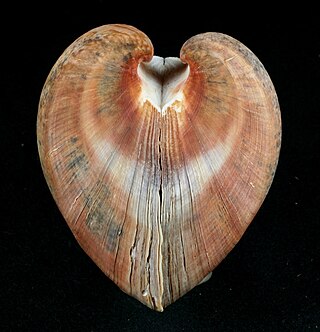
The false ark shells (Cucullaea) are a small genus of marine bivalve molluscs related to the ark clams. The genus is the only member of the family Cucullaeidae.
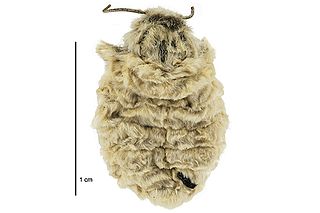
Metacrias is a genus of moths in the family Erebidae. All species are endemic to New Zealand.

Cosmodes elegans, the green blotched moth, is a moth of the family Noctuidae. It is found in New South Wales, Norfolk Island, Queensland, South Australia, Victoria, Western Australia and New Zealand.

Rusavskia elegans, commonly known as the elegant sunburst lichen, is a lichenized species of fungus in the genus Rusavskia, family Teloschistaceae. Recognized by its bright orange or red pigmentation, this species grows on rocks, often near bird or rodent perches. It has a circumpolar and alpine distribution. It was one of the first lichens to be used for the rock-face dating method known as lichenometry.
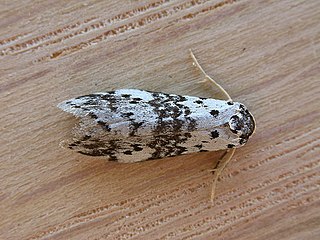
Thallarcha is a genus of moths in the subfamily Arctiinae.

Austramathes is a genus of moths of the family Noctuidae. It is endemic to New Zealand.

Physetica is a genus of moths of the family Noctuidae. This genus is endemic to New Zealand.
Chaetonotus elegans is a species of gastrotrichs in the genus Chaetonotus. It is found in freshwater of Europe.
Polycynodon is an extinct genus of therocephalians from the Late Permian of South Africa. It is known from the Cistecephalus Assemblage Zone. The type species was first described as Octocynodon elegans by South African paleontologist Robert Broom in 1940, but the name Octocynodon was preoccupied by a genus of labrid fish first described in 1904. Along with John T. Robinson, Broom instated Polycynodon as a replacement name for O. elegans in 1948. Polycynodon is classified in Baurioidea, although its relationship to other baurioid therocephalians is uncertain.
Prioniodus is an extinct genus of conodonts in the family Balognathidae from the Ordovician.
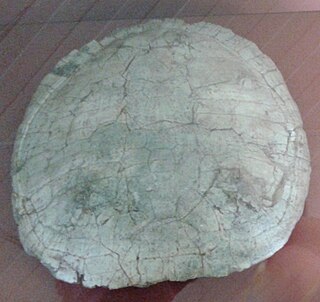
Bauruemys is an extinct genus of turtles in the family Podocnemididae.

Mariannaea elegans an anamorphic fungus. It is mainly found on rotting wood and soil. M. elegans is not pathogenic to humans, animals, or plants.
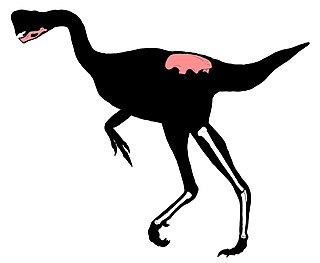
Citipes is an extinct genus of caenagnathid theropod from the Late Cretaceous Dinosaur Park Formation in Alberta, Canada. The genus contains only one species, the type species, C. elegans. The generic name of Citipes is Latin for "fleet-footed", and the specific epithet "elegans" is Latin for "elegant". The type specimen of Citipes has a convoluted taxonomic history, and has been previously assigned to the genera Ornithomimus, Macrophalangia, Elmisaurus, Chirostenotes, and Leptorhynchos before being given its own genus in 2020.
















